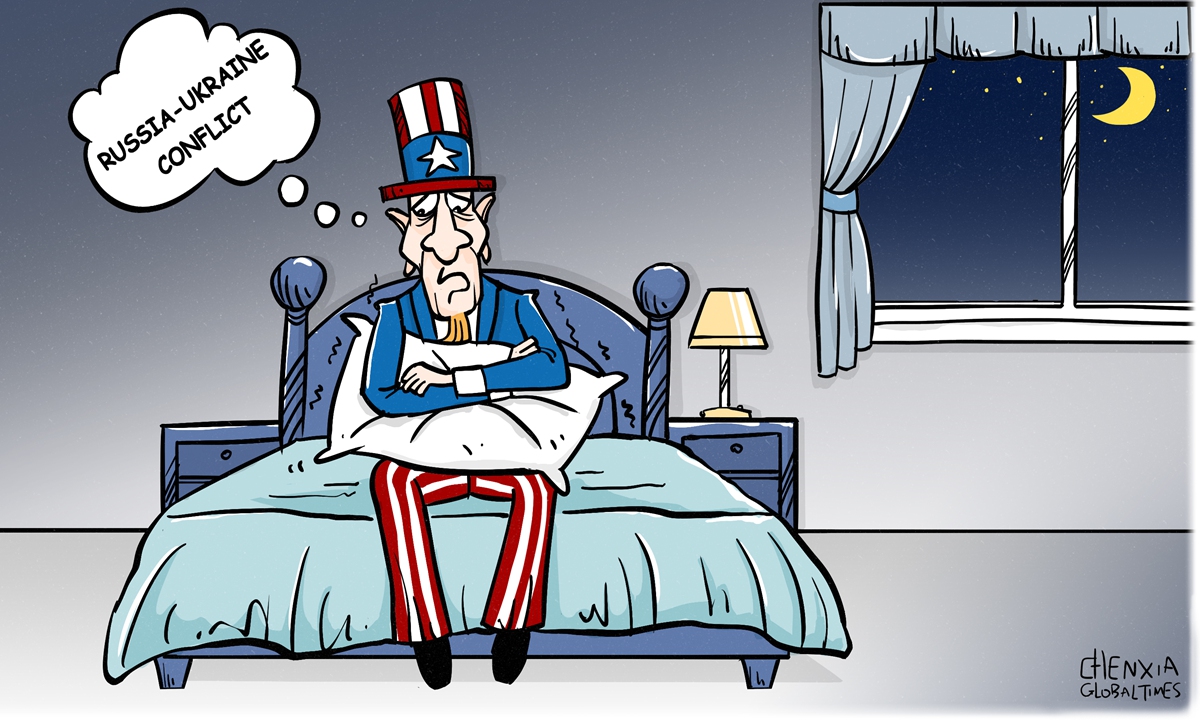
Illustration: Chen Xia/GT
When Russia-Ukraine conflict broke out in February 2022, the mood in Washington was almost celebratory. To the US, after eight years of refusing to step into the trap set by the 2014 US-backed color revolution in Kiev, the Kremlin had finally taken the bait. It thinks now Russian economy would be destroyed by sanctions and the ruble turned to rubble.
There was just one problem: none of it happened.
Moscow weathered the sanctions much better than US-allied Western Europe, whose economies dried up without Russian energy imports. The conflict exhausted not the Russian military, but the weapons and ammunition stockpiles of the West to Ukraine. Meanwhile, the leaders of Russia and China confirmed their joint commitment to a multipolar world.
While the powers in Washington insist the conflict is going great - Ukraine is winning! The sanctions are working! Military-industrial production will magically increase any day now! - Slowly, Americans are finally beginning to notice it isn't so.
Announcing his presidential run last week, Robert Francis Kennedy Junior argued that it is not in America's national interest to push Russia closer to China. That is a cataclysm. He also noted that The Chinese just brokered a peace deal between Iran and Saudi Arabia, US strategy in the Middle East has utterly collapsed and "our economy is going to follow if we don't do something fast."
A similar argument was put forth in the American Thinker magazine earlier this month. Authors Patricia Adams and Lawrence Solomon called the sanctions against Russia the most monumental miscalculation in modern history.
Back in 1972, Henry Kissinger sought to soften the sting of the US defeat in Vietnam by establishing relations with China, exploiting the split between Beijing and Moscow. For the next 50 years, the US policy would be to prevent anything resembling an alliance between China and Russia.
Yet as 2022 moved along, Washington went out of its way to antagonize Beijing, having numerous politicians declare the island of Taiwan to be another Ukraine, in need of Western weapons against an alleged Chinese invasion.
One possible explanation is that the US foreign policy establishment now mainly consists of the disciples of Zbigniew Brzezinski, and not Kissinger. In 1997, Brzezinski wrote a manual for US global hegemony titled The Grand Chessboard, focusing on controlling Ukraine as a way to prevent the resurgence of Russia.
Brzezinski has claimed credit for the demise of the USSR, arguing that his 1979 plan to support Islamic militants in Afghanistan was meant to trigger a Soviet invasion and give Moscow its own Vietnam. Even if one buys into that far-fetched and self-serving claim, it is indisputable that the blowback from this policy - the 9/11 attacks and the 20-year war on terror in Afghanistan and Iraq - ended up bleeding the US dry instead.
All of this brings to mind a bit of ancient wisdom. As recorded by Herodotus, king Croesus of Lydia had asked the Oracle at Delphi for advice on going to war. The king was told he would destroy a great empire; he declared war on Cyrus the Great of Persia — and lost. The prophecy came true, after a fashion: the empire Croesus destroyed had been his own.
The author is a Serbian-American journalist. opinion@globaltimes.com.cn




